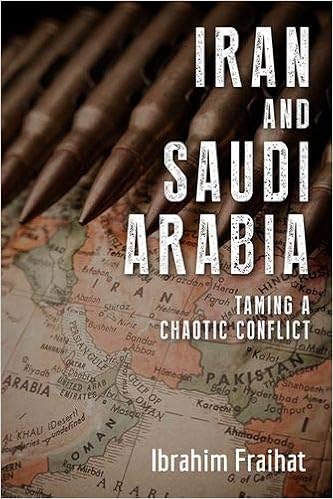 Hostile relations between Iran and Saudi Arabia are a major contributing factor to political instability in the Middle East.
Hostile relations between Iran and Saudi Arabia are a major contributing factor to political instability in the Middle East.
This book argues that rapprochement between Tehran and Riyadh is possible and delves into the complexities of managing their long-standing conflict.
 Editorial Reviews
Editorial Reviews
“Ibrahim Fraihat’s tome is a welcome and timely contribution and, more importantly, offers a degree of hope. While many see the rivalry between Saudi Arabia and Iran in zero-sum ways, Fraihat argues that rapprochement is possible, in a radical and welcome departure from other literature on the topic. Drawing on first-hand attempts to facilitate conflict reconciliation, this rich and insightful tome is essential reading for policymakers, peace-builders, academics and anyone wishing to better understand the politics of the region.” — Simon Mabon, Lancaster University
“Remarkable for its lucidity, fieldwork, and command of the literature, this is a timely and authoritative study of the Middle East’s most consequential bilateral relationship. Ibrahim Fraihat wisely jettisons timeworn primordialist tropes about the intractability and immutability of the Saudi-Iranian rivalry and focuses instead on how tensions between the two powers can be regulated and managed through wiser statecraft, grassroots activism, and domestic reforms. What sets this magisterial book apart from others on this topic is that it moves beyond diagnosis and analysis to propose creative policy recommendations.” — Frederic Wehrey, Carnegie Endowment for International Peace
“In this eminently fair and balanced assessment of the intractable conflict between Iran and Saudi Arabia, Ibrahim Fraihat is in an unenviable position to try to make sense of a nonsensical hostility between two ruling regimes that are wasting their respective nations’ resources and endangering an entire volatile region. A superb strategic intervention as to how to avert a colossal calamity from happening.” — Hamid Dabashi, Columbia University
“A timely and well-informed analysis of one of the Middle East’s most enduring and consequential rivalries. Fraihat offers an insider’s perspective into the Iran-Saudi conflict along with practical suggestions for de-escalation through the lens of conflict resolution. A must for anyone seeking to understand the origins and manifestations of the regional ‘cold war’ between Saudi Arabia and Iran–and potential strategies for ending it.” — Justin Gengler, Social and Economic Survey Research Institute, Qatar University
“This is exactly the book we need right now! Whereas much has been already been written about the causes and developments of the Iran-Saudi Arabia rivalry, we have precious little knowledge about how this conflict can be peacefully managed and ultimately resolved. Fraihat combines his own personal experiences of participation in dialogue efforts over the years with the scholarly insights of the large body of research on conflict resolution, in order to shed light on this. The book gives us a solid basis for analysing the prospects and challenges for how to transform the current destructive relationship between these two regional powers into more constructive interactions, a transformation that would radically change the Middle East region, and thereby the world.” — Isak Svensson, Department of Peace and Conflict Research, Uppsala University
“Ibrahim Fraihat is not a newcomer to the field and has already distinguished himself with a strong body of work on Saudi Arabia, Iran, and also KSA-IRI relations. It is clear in this book that Ibrahim comes closest to shining light on the way forward. I think we all need to take note of this outstanding research and learn from it, for both scholarly and practical reasons.” — Anoush Ehteshami, Durham University
“This is a thorough account of one of the most important interstate rivalries in recent decades, one that has done much damage in the wider Middle East and Islamic World. This book stands out for not only providing a lucid analysis of the drivers of conflict between Saudi Arabia and Iran, but also for offering concrete suggestions for reducing tensions between those two regional powers.” — Toby Matthiesen, University of Oxford
About the Author
Ibrahim Fraihat is an associate professor in international conflict resolution at the Doha Institute for Graduate Studies. He previously served as senior foreign policy scholar at the Brookings Institution and taught conflict resolution at Georgetown University. He is the author of UnfinishedRevolutions: Yemen, Libya, and Tunisia after the Arab Spring (Yale UP, 2016) and co-author of Libya’s Displacement Crisis: Uprooted by Revolution and Civil War (Georgetown UP, 2015). His analysis on Middle East politics has also appeared in Foreign Affairs, Foreign Policy, the New York Times, Huffington Post, Newsweek, and AlJazeera. Graduate of George Mason University in 2006, he is the recipient of the University’s Distinguished Alumni Award (2014) for his achievements in the field of conflict resolution in the Middle East. Fraihat is a non-resident fellow at the Middle East Studies Forum at Deakin University in Australia. He consulted for numerous international organization on Middle East affairs like conflict resolution, national reconciliation, national dialogue, mediation, post-conflict reconstruction, and political transitions.
- Paperback: 248 pages
- Publisher: Edinburgh University Press (February 28, 2020)
- Language: English
- ISBN-10: 1474466192
- ISBN-13: 978-1474466196


